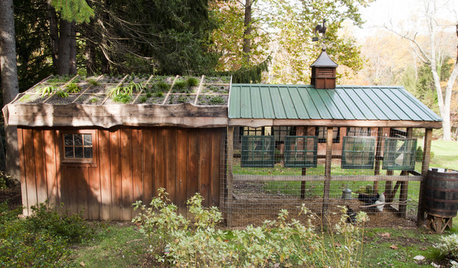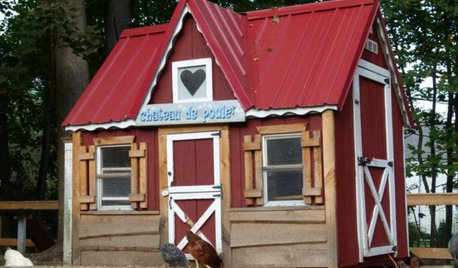How Do You Tell When Chicken Manure is Fully Composted?
macthayer
16 years ago
Related Stories

GARDENING GUIDESThe Poop Scoop: Enrich Your Soil With Good Old Manure
Get over the ick factor already — this natural super-ingredient for soil has so many benefits, you'll wonder why you ever went chemical
Full Story
GARDENING GUIDESGet on a Composting Kick (Hello, Free Fertilizer!)
Quit shelling out for pricey substitutes that aren’t even as good. Here’s how to give your soil the best while lightening your trash load
Full Story
FUN HOUZZHouzz Call: Tell Us About Your Dream House
Let your home fantasy loose — the sky's the limit, and we want to hear all about it
Full Story
MOST POPULARWhen Does a House Become a Home?
Getting settled can take more than arranging all your stuff. Discover how to make a real connection with where you live
Full Story
WORKING WITH PROSWorking With Pros: When You Just Need a Little Design Guidance
Save money with a design consultation for the big picture or specific details
Full Story
KITCHEN DESIGNCooking With Color: When to Use White in the Kitchen
Make sure your snowy walls, cabinets and counters don't feel cold while you're riding white's popularity peak
Full Story
FARM YOUR YARDHouzz Call: Show Us Your One-of-a-Kind Chicken Coops
Do you have a fun or stylish backyard shelter for your feathered friends? Post your pictures and stories in the Comments!
Full Story
GARDENING AND LANDSCAPINGRaise Backyard Chickens Without Ruffling Neighbors' Feathers
Before you build a coop in the backyard, follow these strategies to help keep your neighbors from squawking
Full Story
GARDENING AND LANDSCAPINGChicken Coops That Rule the Roost
These 8 chicken coops designed by Houzz users will have you clucking in admiration — and maybe even planning a henhouse of your own
Full Story
PETSWorld of Design: Pampered Pets and Their 10 One-of-a-Kind Homes
Fall in love with these critters and their clever living spaces, from a cat playground in France to a chicken house in the U.S.
Full StoryMore Discussions







bpgreen
Kimmsr
Related Professionals
Accokeek Landscape Architects & Landscape Designers · Arlington Landscape Contractors · Broomfield Landscape Contractors · Los Banos Landscape Contractors · South Portland Landscape Contractors · Yukon Landscape Contractors · Irvington Landscape Contractors · Lauderdale Lakes Landscape Contractors · Greenfield Landscape Contractors · Austin Decks, Patios & Outdoor Enclosures · Freehold Decks, Patios & Outdoor Enclosures · Glasgow Decks, Patios & Outdoor Enclosures · Layton Decks, Patios & Outdoor Enclosures · San Jose Decks, Patios & Outdoor Enclosures · Woodland Hills Decks, Patios & Outdoor EnclosuresBelgianpup
kayhh
robin_maine
annpat
cavamarie
annpat
cavamarie
annpat
smacbeth68
toxcrusadr
kimmq
Richard Brennan
kimmq